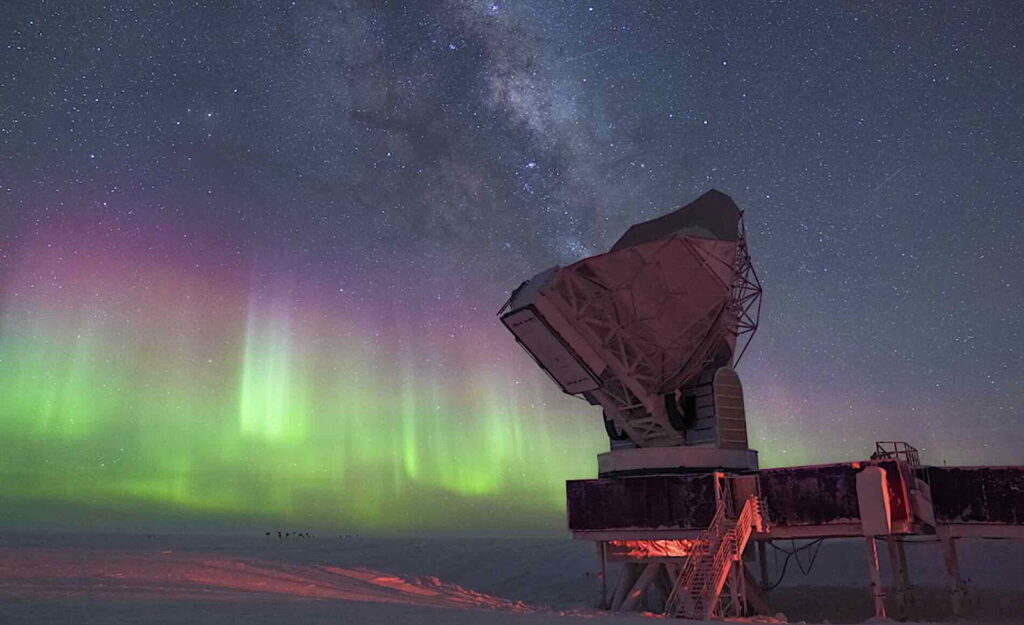
Screenshot
Dark Energy, the enigmatic force believed to be driving the universe’s accelerated expansion, might be losing its momentum. This groundbreaking revelation comes from researchers analyzing data from Antarctica’s South Pole Telescope, suggesting a potential slowdown in cosmic expansion and prompting a reevaluation of existing cosmological models.
The findings align with previous studies, but the new data is the most precise ever collected. This sets a new benchmark as scientists confront the possibility of revising the Lambda-Cold Dark Matter (Lambda-CDM) model, which has been the cornerstone of cosmological understanding for decades.
Revisiting the Lambda-CDM Model
The Lambda-CDM model posits that dark matter’s gravitational pull created dense regions that attracted ordinary matter, leading to the formation of galaxies and stars. However, this model faces a paradox: the combined gravitational forces of ordinary and dark matter should decelerate cosmic expansion. Yet, observations since 1998 have shown the opposite, with the universe expanding at an accelerating rate.
To reconcile this discrepancy, astronomers introduced the concept of dark energy, a theoretical form of energy that counteracts gravity. Despite its elusive nature, dark energy is thought to constitute about 70% of the universe, influencing its expansion dynamics.
The Role of the South Pole Telescope
The South Pole Telescope, a collaborative effort involving over a dozen institutions, features 16,000 detectors within a 10-meter telescope at Antarctica’s Amundsen-Scott South Pole Station. For more than two years, an international team has gathered data, covering 1/25th of the sky, focusing on temperature and polarization patterns in the cosmic microwave background radiation.
This data, combined with 3D galaxy distribution information from the Dark Energy Spectroscopic Instrument (DESI), suggests that dark energy’s influence is waning over time. The observations provide tighter constraints on existing models, refining the sound horizon scale to about 13.8 billion years ago, marking a significant improvement since the Planck satellite’s measurements a decade ago.
“The combined data from DESI and the South Pole Telescope reduce confidence in the concept of a cosmological constant, indicating that dark energy may evolve over time.”
Implications for Cosmological Theories
When Einstein formulated his theory of relativity in the early 1900s, he assumed a static universe, introducing a cosmological constant to prevent gravitational collapse. However, this idea was abandoned after Edwin Hubble’s 1929 discovery of an expanding universe. The cosmological constant later re-emerged to explain the accelerating expansion. Recent observations challenge this notion once again.
If dark energy is indeed weakening, it could signify a major paradigm shift in our understanding of the universe. Scientists face the daunting task of either adapting the current model to accommodate time-evolving dark energy or rethinking the general theory of relativity itself.
Achieving scientific consensus on such a radical claim requires a confidence level with less than a 1 in 3.5 million chance of error, the “gold standard” for scientific acceptance. Researchers are actively pursuing this goal, with DESI-2 in planning and the South Pole Telescope slated for a receiver upgrade in 2028.
The Future of Cosmic Exploration
Meanwhile, the Simons Observatory will commence its survey later this year, and the CMB-S4 experiment is targeting a launch in the 2030s. These projects aim to provide crucial data to determine whether the universe’s expansion is indeed slowing and to understand the broader implications of such a phenomenon.
As scientists continue to unravel the mysteries of dark energy, the future of cosmology remains both uncertain and exciting. The potential weakening of dark energy could redefine our understanding of the cosmos, opening new avenues for exploration and discovery.
Ryan Whalen covers science and technology for The Debrief. He holds an MA in History and a Master of Library and Information Science with a certificate in Data Science. He can be contacted at [email protected], and follow him on Twitter @mdntwvlf.





